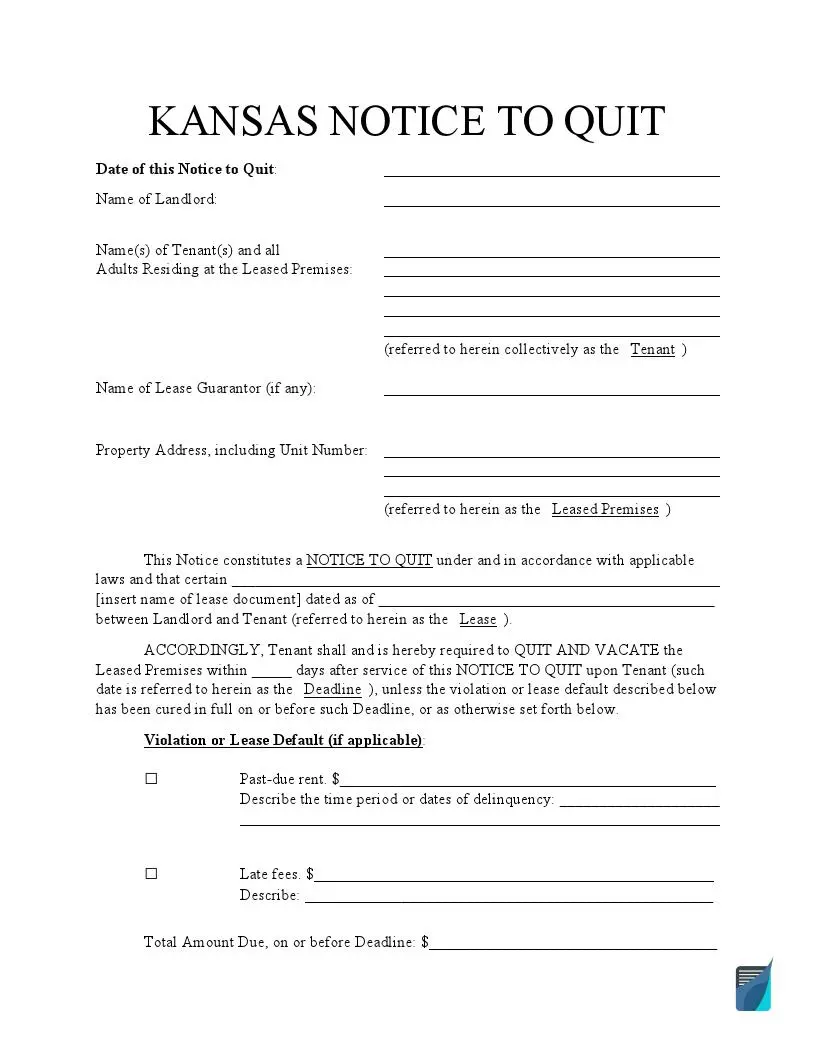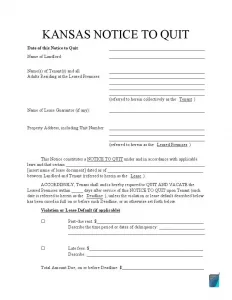Kansas Eviction Notice Forms
Starting landlord-tenant relations, both participants should understand that this kind of connection is temporary and will be discharged sooner or later. The elimination of the lease contract can have different reasons — from a mutual wish following agreements with a certain end of the term to violations that may be a result of both parties’ actions. In most cases, the breaches are caused by the residents’ activities; therefore, a landlord needs to follow the law and draw up an eviction notice form to make the lessee leave the property.
Kansas eviction notice templates rely on different reasons. These could be late payments or more severe violations that a landlord cannot find acceptable. We will cover the types of eviction letters in the state of Kansas in further sections of this review.

Build Your Document
Answer a few simple questions to make your document in minutes
Save and Print
Save progress and finish on any device, download and print anytime
Sign and Use
Your valid, lawyer-approved document is ready
Kansas Eviction Laws
Regardless of the removal letter’s nature, the proprietor must notify his or her resident in a written manner and record the evidence that the recipient has been informed. Following the terms of warning for quit, the estate owner grants the lessee some time to cure the matters or vacate the dwelling unit. In the matter the lessee refuses to follow either requirement, the proprietor acquires legitimate power to file documentation for eviction in court.
Eviction matters in Kansas are regulated by §61-38 and §58-25 of the Kansas Statutes Annotated. You will find inherent data on the following matters:
- Failure to provide the rent
- Failure to follow the agreement terms (violations)
- Month-to-month end of the contract
- Rent grace interval
- Removal lawsuit
Kansas Eviction Notice Laws Details
| Rent Grace Period | As stated in the lease |
| Notice of Non-Payment | 10 days |
| Notice of Non-Compliance | 14 days |
| State Laws | Kansas Statute, Chapter 58, Article 25 |
Eviction Notice Types Used in Kansas
Kansas introduces several types of eviction notice templates. Each form relies on a particular reason. You are empowered to generate a proper template via our advanced software. The Kansas five alternatives are as follows:
14-Day Eviction Letter (for Noncompliance)
When a lessee breaches the contract, the lessor obtains powers to ask the tenant to leave the premises. Therefore, the landlord should prepare and serve an eviction letter for noncompliances. Should it happen, the lessee is granted two weeks to fix the issue or vacate the residency.
10-Day Eviction Notice (Failure to Execute Payment)
If a tenant has been renting the property for more than a three-month period and performs late rent, the tenant is granted 10 days to submit the rent amount or quit.
Three-Day Letter to quit (Failure to Execute Payment)
This type of termination letter is similar to the previous one. The difference lies in terms of the lease. If the lessee fails to fulfill the rental payment and has been leasing the space for less than three months, he or she has three days to cure the matter: provide the payment or leave the premises.
30-Day Letter to Quit (for the Second-Time Violation)
Under Kansas statutes, the owner of the dwelling unit should give reasons for eviction. If, within a period of half a year, the lessee breaks the agreement again in the same manner, the landlord will ask him or her to move out without giving another chance. Thus, the property owner will serve a 30-day Notice to Quit.
30-Day Eviction Notice (Month-to-Month lease)
This document is also registered as a termination letter in Kansas. It demands that the property owner grants a minimum of 30 days to cancel the lease. This period will be enough for the lessee to find a new residence more or less comfortably. This type of eviction notification is usual for month-to-month contracts and doesn’t imply any violations on the tenant’s part.

Eviction Process in Kansas
When a tenant performs etiquette incompetency: violates the arrangements settled and authorized in the lease agreement and refuses to cure the matters, the landlord should seek assistance from higher authorities. It launches the eviction process. There are certain steps that individuals have to complete to seek protection legitimately.
- Serve Notice to Quit
When negotiations fail, the landlord should fill out an eviction letter and notify his or her tenant serving the notice by certified mail or in person. Choose a template relying on the reason for the breach and generate a form using our latest software to gain outstanding results.
- File the Documents to Court
This step continues disputes if the lessee ignores the notice to quit. The landlord should turn to the local District Court providing the completed and notarized Petition for Eviction and the Civil Cover Sheet.
Make photocopies of the Petition to distribute to the tenant(s) and fulfill filing charges.
- Collect the Eviction Summons
Once the required documentation has been filed, the lessor should collect the Summons from the Clerk since the paperwork contains the date of the hearings.
- Compile the Paperwork Copies
Compile the Summons and the Petition copy and turn to the Sheriff. He will deliver the documents to the tenant(s).
- Appear at Court and Wait for the Judgement
After the process, the lessor should collect the Journal for Possession. Compile the paperwork with the Certificate of Service and deliver it to the lessee.
- Complete the Eviction Process
The tenant(s) should vacate the residence after receiving the Journal of Judgement. However, if they ignore the verdict and stay within the property territories, the owner should submit the Writ of Restitution. Since now, the County Sheriff will conduct the eviction not later than 10 days after the filing.
- Serve a Motion Certificate (If Needed)
Should the landlord acknowledge any property destruction caused by the tenant’s actions, he or she can evoke a Motion and file it to Court. After that, the owner needs to include it in the Certificate of Service and mail it to the lessee.
Kansas Eviction Court Forms
Kansas provides eight legal templates that might be of importance.
- Petition for Eviction and Rent
The template is essential in case the lessee fails to provide rent payments.
- Writ of Restitution and Execution
Deliver this paperwork to the County Sheriff to empower him to remove the lessee from the dwelling unit within a specified period.
- Certificate of Service
This is a form that proves the delivery of notifications to the lessee.
- Journal Entry for Possession
The judge completes the form and provides it to the landlord. The latter uses the document to confirm the approved eviction to the tenant(s).
- Civil Cover Sheet
This form describes the essence of the happening matter.
- Petition for Eviction
If the lessee violates the agreement performing other than late rent matters, utilize this paperwork.
- Writ of Restitution for Immediate Possession
Present this paperwork to the County Sheriff to enable him to remove the lessee from the dwelling entirety instantly.
- Eviction Summons
This legitimate form is issued by the Court. The landlord uses a copy of the form to let the tenant(s) acknowledge that they are at suit.

Interested in more Kansas forms? We provide free templates and straightforward personalization experience to anyone who hopes for having fewer to none difficulties when facing paperwork.
Other Eviction Notice Forms by State
